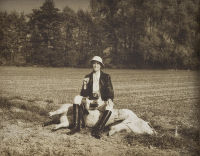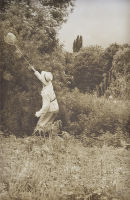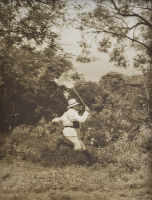"Safari Deutschland"
wooden frame with linen covering, mounted on 8 individual wooden frames with gelatin silver prints
frame in total
signed and dated on recto
It seems to be typical of Reusse that he is on the trail of the invisible and brings it to objectivity, i.e. to physical and psychological perceptibility. Beyond the philosophical quality it contains, this is also a trait of a special ironic and epistemologically distanced attitude to the world: Reusse is not interested in the object as such, but in what lies behind it.
He does not encourage the constant disguising of the world and thus of our minds through objects, but in his attempt to make it transparent, he forces the viewer into an attitude of searching and finding their own position. He prevents the simple registering and cataloging, the pigeonholing that all too often seems to be our only means of orientation in this world in order to keep some order in it.
So it is not mapping that is essential, but transparency. That certain methods need to be found for this is one side of the coin. Another side is rather the attitude of the surrealists: the chance encounter of a sewing machine with an umbrella on the operating table. Only what seems surreal or merely ironic at first glance becomes a bitter realization once the moment of initial laughter has passed. This becomes particularly clear to me in the series of works entitled “Happy Hunters”, Safari Germany, in which the poses and out-fit of a colonial attitude are recreated. The photo seems to be contemporary in its brownish tint. The mostly life-size depiction corresponds to the attitude of the time. The arrogant pose of the victor is a necessary and exclusively intended self-portrayal. The visible object and reason for the pose is what makes the >enlightened< laughter freeze over: it makes one think and - hopefully - becomes the trigger for the intended chain of associations, which ends with the self-questioning of the viewer and his position in our time; the question of how far away we really are today from such an - only seemingly past - attitude, how much it has really been overcome today.
(from: Jürgen Schweinebraden Frhr. v. Wichmann-Eichhorn, Zum Werk von Stephan Reusse, Kassel 28.3.1993, online, translated with DeepL.com)

















